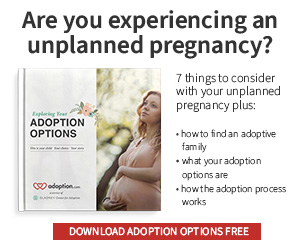As expectant birth parents quickly learn, there isn’t a definitive one-size-fits-all manual for coping with an unplanned pregnancy. Every decision comes with life-changing permanent consequences. If you, as an expectant father, are considering adoption, you may find yourself questioning your role. Maybe you wonder: what is the “right thing” to do? The answer, in most cases, is something you’ll have to find within yourself, and varies with each situation. However, there are a number of basic guidelines you can follow in order to nurture a good relationship with the birth mother and, eventually, your birth child.
1. Define the relationship.
The relationship between two expectant birth parents can be hugely varied and difficult to define. Wherever there is a sexual relation, there is potential for a pregnancy. The societal consensus of abstinence until marriage has been generally dismissed; casual sex is fairly common. Whether you are committed to your partner or just acquaintances, a pregnancy will change the dynamics and expose each of your priorities.
My own relationship with the birth father was vague before the pregnancy even happened; the news that I was expecting actually silenced the dialogue we should have been having about what it meant for us. Rather than explicitly outlining our hopes or expectations, we grew steadily distant in a sort of competition of who could care less about the relationship. This caused significant heartache for both of us and destroyed the frail bridges we’d attempted to build.
It may seem like an uncomfortable time, but be willing to talk about what the pregnancy means for you. Also talk about your feelings for each other. The choice to place a child for adoption often has origins in the state of the relationship between birth parents. It’s far better to express your hopes for the relationship early on, before she builds expectations of something else.
2. Don’t blame each other.
All too often, women are accused of “trapping” men into relationships by intentionally getting pregnant. Because of the popularity of oral contraceptives and women’s ability to track their ovulation, many place responsibility on the woman to “keep from getting pregnant.” Dismiss the notion that the birth mother intentionally became pregnant; being accusatory will only paint you in a poor light to all involved in the adoption.
Regardless of who initiated the sex, the form of birth control used, or the perceived responsibility of either party, don’t place blame. Placing blame or taking punitive measures will cloud your judgment. It is important to make choices regarding the child with a clear mind and pure heart. Through the pregnancy will affect each birth parent differently, each should do their best to act fairly and as partners.
3. Offer financial support.
Pregnancy is a financial burden. The cost of prenatal care, in addition to other maternal expenses, can be overwhelming for a single woman to pursue. In a situation where the word “support” could otherwise seem very vague, this is one concrete way you can contribute to the birth mother.
Finances are one of those hot-button taboos that people don’t often discuss. But in this situation, it is appropriate for a birth father to offer the birth mother money expressly for prenatal care. In a platonic relationship, buying gifts may come across as mixed or confusing. Instead, find a way to shoulder expenses in a non-emotional way.
4. Speak up.
Pregnant and considering adoption?
Get your free adoption benefits and support bundle

Because of the general silence we maintained, I often found myself guessing what the birth father was thinking. In hindsight, I realize I may not have been the most receptive listener: when I told him I was pregnant, I also told him that I intended to place and move away. I sometimes regret that I didn’t ask for his opinion; adoption itself wasn’t a decision we made together, though we eventually agreed that it was for the best.
If you are feeling uneasy about placing and want to explore other options, present your thoughts and feelings to your partner. You will regret not doing so. While the ultimate choice rests mostly with the expectant mother, you have the right to be heard. Voice your concerns rationally, and your feelings calmly. Unfortunately, not all birth mothers are receptive. In these cases, it may help to communicate the great importance the situation has to you, and express your care for the child.
5. Follow through.
For young people especially, nine months is an extensive amount of time. Those months are hugely transformative for both expectant parents, and you may not feel like the same person by the end as you did at the beginning; this is one of the challenges of planning for your future. Still, if it is conducive, continue to show support for the birth mother throughout her pregnancy, not just the beginning.
Your relationship is likely to change as those months go on. Your desire to spend time or correspond with the birth mother may diminish. Don’t force niceties where they are not due, but avoid breaking contact completely. It may help to explicitly ask her how you can help, though she may not have an answer. Relationships are a two-way street, and you are only responsible for your side of the road. It is advisable, though, to be sensitive to her during the different phases of her journey. Be compassionate. It will go a long way in terms of a mutual relationship.
Unlike birth mothers, who are often given plentiful advice and counseling, birth fathers are often faced with their challenges alone. There is painfully little in the way of literature to guide birth fathers. If you are an expectant father considering adoption, understand that your efforts to care for your birth child will pay off. You, too, are giving a magnificent gift to a family.


